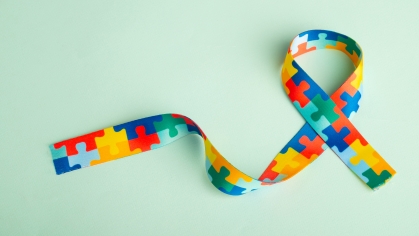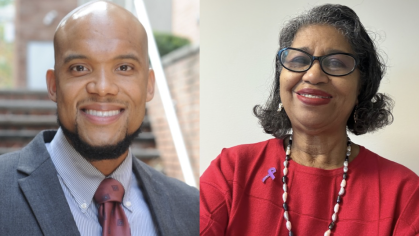By Edward Alessi, as told to Hannah Loffman
Hannah Loffman: Tell us a little bit about your journey to social work.
Edward Alessi: My journey to social work began during my undergraduate college years where I majored in sociology; the focus was on clinical sociology. The sociology department offered courses that were very similar to those in an undergraduate social work program, and I had done internships and was able to really see that I wanted to help others. I wanted to be able to provide counseling and support, and also be involved in understanding the whole experience of the person. I wanted to get a more holistic, biopsychosocial perspective and figure out how social forces impact the way people think and feel and how they deal with day-to-day experiences. I went to graduate school for social work in New York City, and I became more interested in micro practice after my foundation practice course. I had a very inspiring social work professor, Ellen DeVoe, who is now at Boston University, and I thought to myself, “this really seems like a good fit for me.” I became more interested in mental health and clinical social work, and my placements in my second year were clinically focused. I spent a lot of time working in outpatient mental health, dealing with people with adjustment disorders, phase of life issues, as well as more serious mental health issues. In particular, those dealing with depression, schizophrenia, bipolar disorder, and more severe trauma related disorders.
Your research and interests include lesbian, gay, bisexual, transgender, and queer mental health issues. What led you on this path?
I had always been interested in the effects of living with a stigmatized identity, particularly among LGBTQ people. When I decided to go for a PhD in social work, I was still practicing, and I became interested in the health of gay men working with my advisor Jim Martin. In particular, I wanted to understand how gay and bisexual men negotiate sexual situations and whether stress and victimization plays a role in sexual risk-taking behavior. I also became interested in minority stress after reading articles about how living with a stigmatized identity was a risk for particular mental health problems such as stress sensitive psychiatric disorders, so depression and anxiety.
I followed Ilan Meyer’s work, who was at the Mailman School of Public Health at that time, and my advisor at NYU was able to connect me to him. I used his data set for my dissertation, which was on post-traumatic stress disorder (PTSD), comparing prevalence between LGB and heterosexual people. It was through this work that I became more interested in processes related to minority stress and trauma among LGBTQ populations. After finishing my dissertation, I took interest in LGBTQ global health issues, particularly understanding of what it was like to live in countries where rights for LGBTQ people were limited and non-existent. I thought about what it means to live in a country where you can't move to a different city and get some relief from being stigmatized, as many of the same laws and policies exist no matter where you go, and I looked at what it means to build support systems when there are few protections for LGBTQ people, because those support systems many times are in the form of underground advocacy groups.
From this line of research, I was able to better understand migration among LGBTQ people. In particular, how migration processes (pre-migration, in transit, arrival in destination) create differential exposure to risk. I wanted to look at risk at each stage in the migration process and understand what ends up happening at the destination. LGBTQ migrants have been exposed to cumulative trauma. So, how does that cumulative trauma present in host countries and how does it impact integration? When LGBTQ migrants arrive in countries where they don't know many people, we need to understand what it's like to be an LGBTQ person with multiply marginalized stigmatized identities. This includes being LGBTQ, being a racial ethnic minority, being a migrant, being marginalized because you don't speak the English language or English is another language for you. It’s about how they deal with these multiple marginalized identities, and how it confers excess risk, or sometimes even leads to resilience and strength.
Why is Pride Month important to you, and to communities in general, to celebrate?
June is an important month in the United States in particular. June is Pride Month because it coincides with Stonewall. While Stonewall was not the only form of LGBTQ resistance, advocacy, and protest, it was one of the most widely watched social movements. People saw it happening, read about it, watched it on television, heard about it, and it took place over a number of days, so it increased people's awareness. There were also trans people and people of color who were a really important part of the movement. It's important because we've come quite a long way, and we should celebrate that we have come a long way. For example, certain protections are now in place. We can celebrate that the Supreme Court is now protecting LGBTQ people in the workplace. We have equality when it comes to marriage at both the state and federal level. In many places, there is societal acceptance and integration into communities while LGBTQ identities are celebrated, affirmed, and protected in psychology and social work, literature, and public health.
There's lots to celebrate, but there is also a lot more work to do. We have many successes, but we also have people trying to roll back those successes. The previous administration showed numerous ways that was happening, particularly when it came to trans people. We still have recent legislation that's being put forth with respect to trans people in multiple states, so there still needs to be a lot of advocacy. We still need to contact our senators to ensure that LGBTQ people are protected throughout the United States – not just in certain states.
Right now, trans people continue to suffer because of legislators who are trying to police their identities, and we need to ensure that we are advocating and working for justice for all LGBTQ people.
We're also understanding that LGBTQ people have multiple identities. They are racially, ethnically, and culturally diverse. They are not a monolith and have different needs and priorities. While there are similarities among LGBTQ people in general, there are also differences and we have to acknowledge them. An example of this is that we know Black trans women face some of the highest prevalence of violence.
To the point, what are some things the social work profession or social workers can do to increase awareness of the stereotyping and discriminatory practices against the LGBTQ community that we see around us?
When it comes to practicing with the LGBTQ community, the first thing that's really important is training. We know from research and studies that training will correlate with better attitudes. We need to improve attitudes of how we think about the LGBTQ population. We also need to improve our knowledge. We need to understand LGBTQ history, we have to understand minority stress and how it impacts LGBTQ people, and we have to understand intersectionality. As I mentioned before, LGBTQ people are not a monolith, and for certain LGBTQ people, coming out is not a priority. Certain LGBTQ people are also dealing with issues related to racism, classism, and ableism, and we also have to remember that we have to deal with those issues as well. We're moving beyond the idea that the LGBTQ community is comprised of white gay males in cities; we have LGBTQ people in rural communities, too. We need to understand how these intersecting identities for some people create opportunities, and for others they do not create opportunities. For some, there could be more risk. For example, they may face more health disparities and barriers to health care services, getting the right care, and even connecting with others. We need to bring that level of awareness to the forefront so that we can begin a conversation about what is happening. This will lead to social work programs to prepare students to address these health disparities.
We must offer training to change and improve attitudes, to increase knowledge related to intersectional identities, and to increase skills that help people work with diverse LGBTQ populations. People also need to be aware of trans-specific practices and the impact of legislation and how laws affect people feeling safe, and whether they can live their lives with freedom.
You teach a course called LGBTQ Issues in Contemporary Society. What can students do to learn more if they're not taking this course to expand their knowledge?
As a social worker, you have a responsibility to engage in continuing education, and that means familiarizing yourself with the policy issues that affect certain populations. In this moment there are groups who are trying to diminish and take away certain rights of LGBTQ people. It's important to be aware of those policies. You have practice implications and affirmative practices. Practicing affirmatively is not the same as practicing without discriminating, and there are certain things you need to do to be affirmative. You have to make sure that the literature you have in the office and the pictures you hang in your office are representative of LGBTQ communities. You have to be sure that you're using the proper pronouns. Don’t assume that somebody is heterosexual or cisgender, don’t make assumptions about identity, and ensure your forms in the office are up-to-date and are inclusive.
Programs also have to be able to have reach those who need access to things like technologies and opportunities within the community. We must make sure people are connected, reminding ourselves that there are differences based on, for example, racial and ethnic identity, gender identity, and migration status. We really need to focus on being affirmative but also anti-oppressive. We need to be knowledgeable about different cultures and have cultural humility and competence.
Do you find that there are these opportunities beyond the continuing education courses that are offered for those kinds of learning outlets for MSW students? Do you think there are learning opportunities to engage in conversation and practice cultural humility and competency around affirmations?
I am so immersed in this area of study, so it does seem like it's available, but I think it's a good question. If you're not a researcher in this area, does it seem available? So I'm actually going to ask you that question. Is it?
My immersive experience in the School of Social Work has been attending the Social Workers Advocating for GLBT and Gender-nonconforming Equal Rights (SWAGGER) meetings. I have found that entering that space as an ally, I almost don’t feel immersed in the community itself, which is a little bit of an oxymoron. Allyship, to me, means being a part of the community and engaging with the community despite your differences in personal identification, but I find myself not speaking as much in the conversations for fear of saying something wrong or something being misunderstood. I think it comes from a concern of speaking up and using my voice in spaces where it's a contribution to the conversation rather than a hindrance to the conversation. I think it is also about being in a new community and being a part of the same conversation. So, I think there is opportunity, but I feel a little bit like it's a sliver of the opportunities.
I think you're asking a good question. How do we increase allyship in a way that feels genuine and authentic, so that allies feel that they're truly having an impact that feels hopeful? How do we do that so it's effective and so it’s promoted? I think it's a wonderful question. I think we have to figure out how to make better use of allyship.
Allies have a lot of influence and power, and I think just sitting here interviewing me, and asking me these questions is allyship. You're giving me the opportunity in this space to speak; you're not telling me how things are. You're letting my experience as a researcher in this area, but also, as an LGBTQ individual come forward, and you're not stopping me. You're validating my experience. I think that's what allies have to do rather than challenge. They have to validate.
They might have to challenge people who are being sexist, homophobic, transphobic, and that is an important challenge they have to take on.
What I think about when I have attended the SWAGGER meetings, is, in what ways am I showing up? In entering the space and allowing for sharing of a very emotional experience and a very vulnerable experience, in what ways can I validate and affirm?
Many LGBTQ people have the support of their allies in interpersonal situations, and they've been very helpful when families reject an LGBTQ person. Many allies are part of an LGBTQ person's chosen family. But then there is allyship that is more public because you're defending LGBTQ rights. You're making it known that you are there to support the community, and sometimes that could even be challenging heterosexual comments. Allies call their Congresspeople and work with other LGBTQ people to mobilize change. There are different types of allyship, just as there are different fields of social work practice, but there are also these ways that you can use your interpersonal skills to be an even greater ally.
What are some ways that people can, if they choose to, celebrate Pride Month?
People have different ways of celebrating. Some people want to celebrate by being with friends, family, or large groups of people while some people want to celebrate by being on a Zoom call with others. Some people want to celebrate by doing more advocacy work, some want to celebrate by writing a journal entry to themselves, talk to an ally, or someone might want to celebrate by telling an LGBTQ friend that they're there for them. When I say celebration, there's not one way to celebrate. The question might be how can we recognize and affirm LGBTQ people? Yes, there is a special month that you want to do it, but how can we do it every day, as well?
For further reading on this topic, please consider these articles from Dr. Alessi:
Alessi, E. J., Kahn, S., Woolner, L., & Van Der Horn, R.** (2018). Traumatic stress among sexual and gender minority refugees from the Middle East, North Africa, and Asia who fled to the European Union. Journal of Traumatic Stress, 31, 805-815.
Alessi, E. J., & Martin, J. I. (2017). Intersection of trauma and identity. In K. L. Eckstrand & J. Potter (Eds.), Trauma, resilience, and health promotion for LGBT Patients: What every healthcare provider should know (pp. 3-14). Springer.
This story was created in partnership with Rutgers School of Social Work's Inclusion, Intersectionality, Diversity, Equity, and Advancement (IIDEA) Committee in support of our commitment to diversity, equity, and inclusion.



